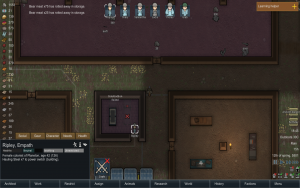Food
|
| This article is a stub. You can help RimWorld Wiki by expanding it. Reason: Needs detail on mechanics e.g. nutrition etc.. |
Food is the basic source of nutrition to both humans and animals. Consuming food provides saturation. Deprivation of food leads to malnutrition and, if prolonged, death.
Summary
Food is measured in units of nutrition. Most raw foods, as well as discrete food like pemmican, give 0.05 nutrition per unit. Prepared meals, such as simple meals or lavish meals, give 0.9 or 1.0 nutrition.
Baseline adult humans require 1.6 nutrition per day. They can "store" 1.0 nutrition at any one time. As they start to eat while they are "hungry" (0.25 saturation), meals are subject to slight overeating. A rough baseline of 2 meals per day, or 32 units of pemmican/raw food, is required to feed a colonist.
Raw food
Food found in its natural stage is raw. Most raw foods will give the −7 Ate Raw Food moodlet to an ordinary colonist. All raw food comes with an innate chance of food poisoning. Milk, berries, and insect jelly can be eaten without mood penalty, but can still give food poisoning.
You can cook food into meals at an electric stove, fueled stove or campfire, or processed at a nutrient paste dispenser. In addition to tasting better, cooked food allows you to get more nutrition off the same amount of raw food. For example, a simple meal costs 0.5 nutrition to make, but gives 0.9 nutrition when eaten - or 180% more food.
Raw food can be obtained from a variety of sources:
- Wild bushes can be harvested to give agave and berries.
- Growing zones can be used to plant rice, potatoes, corn, strawberries and haygrass (for domesticated animals).
- Hydroponics basins can also be used to plant rice, potatoes or strawberries, and grows them at a considerably increased rate.
- Meat is obtained from fresh non-mechanoid corpses, whether hunted or if they died via other means. Corpses may be eaten raw or butchered at a butcher table.
- Occasional drops from cargo pods.
Degradation

Food will be destroyed if left unattended by two entirely seperate factors: exposure and temperature.
- Items dropped in an area without a roof will deteriorate.
- Storing food in temperatures above 0 °C (32 °F) will spoil over time. Temperatures below 10 °C (50 °F) will slow down spoiling by a factor of
1/tempin Celsius. See Temperature for details.
For example: a raider is killed and drops a fine meal outdoors, while temperature is below freezing. The meal will not spoil, but it will still deteriorate, and lose HP. Conversely, a meal stored inside a stockpile at room temperature will spoil rather than deteriorating.
Once spoiled, food will vanish and can never be recovered. However, food can be eaten at any stage before spoiling with no negative effect. Food poisoning comes from other sources, such as a messy kitchen or unskilled cook.